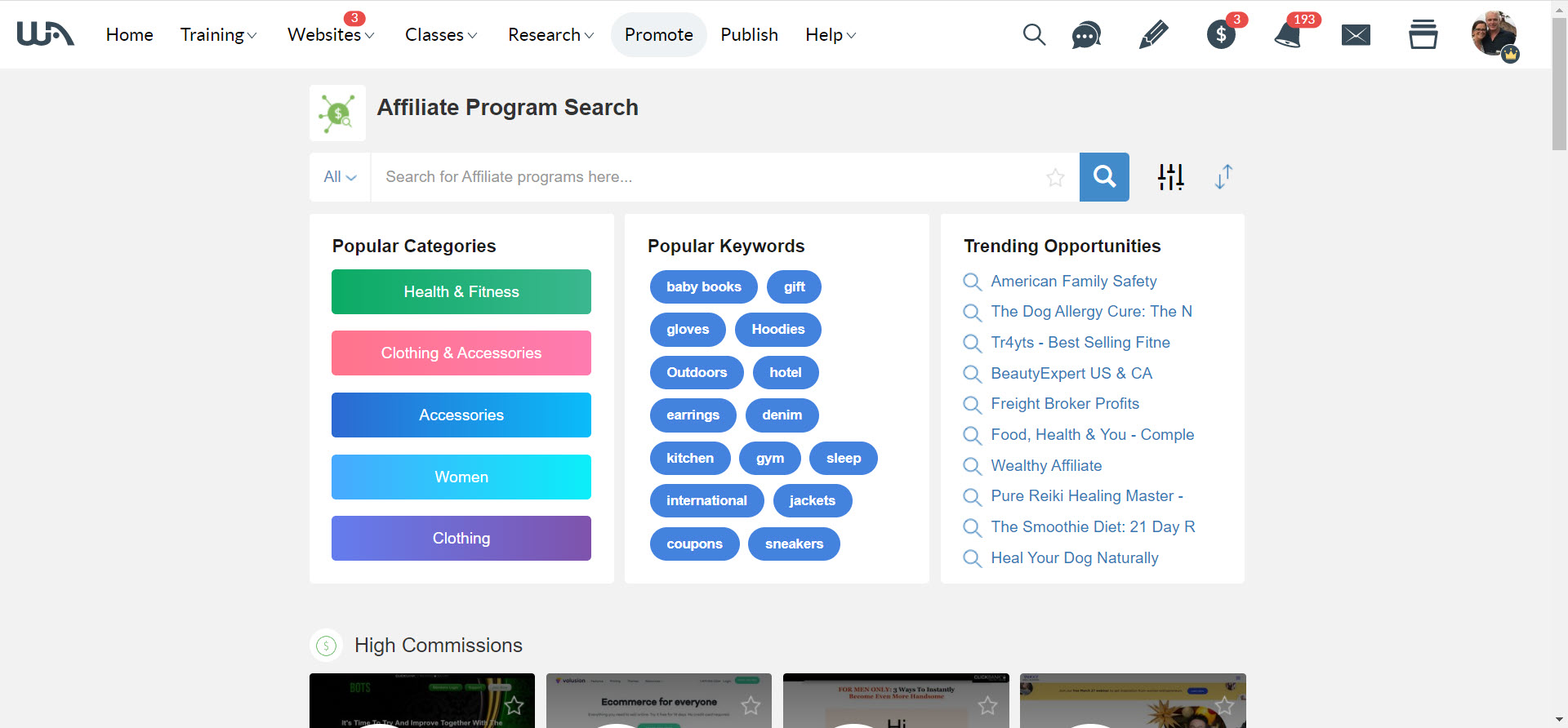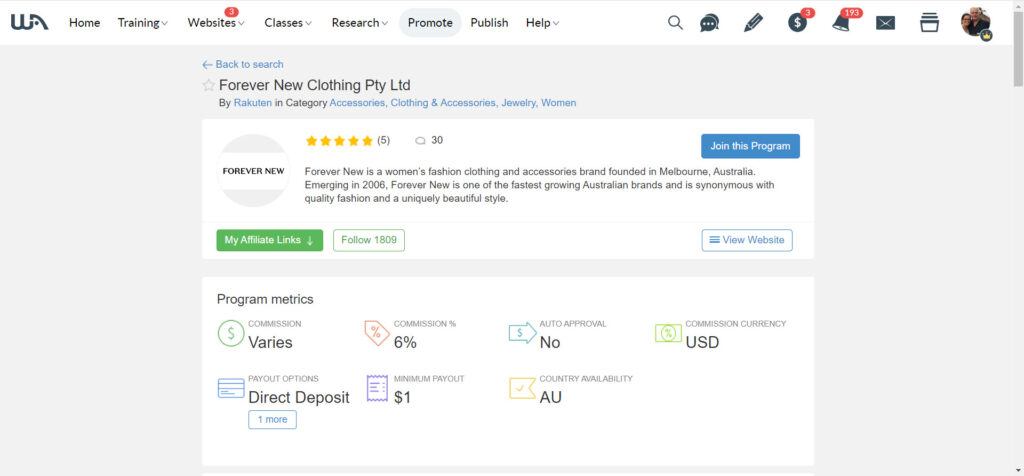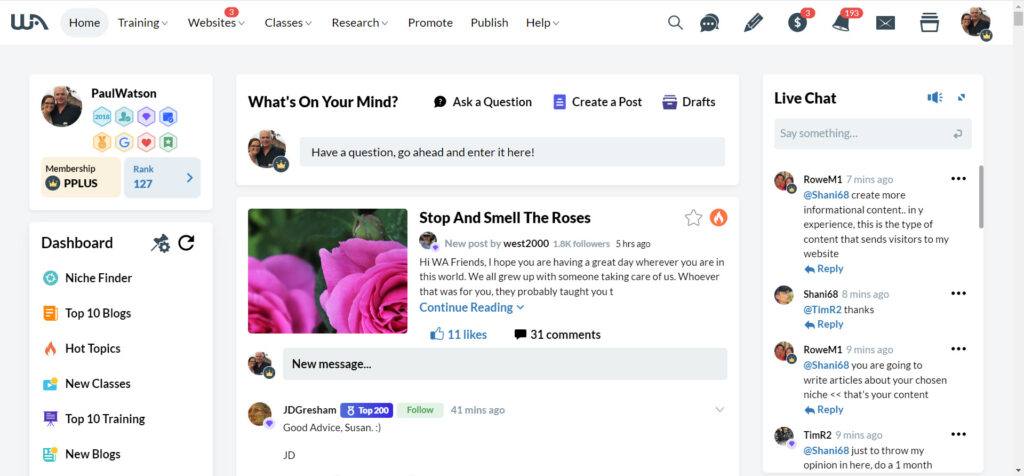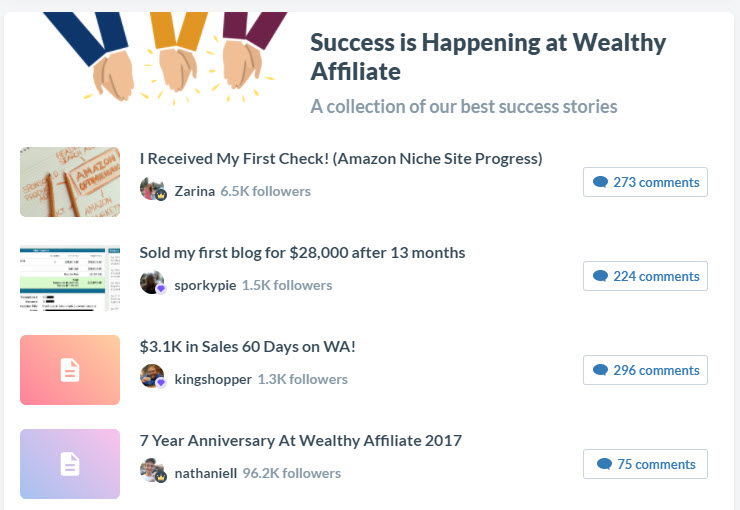Hey there, fellow affiliate marketer! You’re probably here because like me, you’ve caught the affiliate marketing bug and are excited about its money-making potential. Choosing the right affiliate programs is crucial in this journey, and I’m here to help. Let’s dive into the world of affiliate marketing and learn how to pick the best programs to line your pockets with some sweet, sweet cash.
My Story
I started affiliate marketing roughly four years ago writing about essential oils. I eventually sold that site and created one on fishing and outdoors – then I sold that one and am now working on one about travel. Oh, and there are a couple aimed at assisting others setup their affiliate marketing businesses as well – yes, this is one of them.
You see I like to choose things I love to write about and have managed to turn them into an opportunity to make some money working from home as I go – or Bali on a couple of occasions too.
Now, one of the biggest headaches I have had during this journey is the issue of choosing the right affiliate programs for my websites. This can be a daunting experience for many especially when it comes to finding and applying for the program in the first place.
So in this post we will have a look at affiliate program basics and then cover some things that you can follow to find you very own affiliate programs to add to your website.

Understanding Different Types of Affiliate Programs
Before we get into the nitty-gritty, let’s quickly cover the different types of affiliate programs out there.
- Pay-per-sale (PPS) programs – These are the bread and butter of affiliate marketing. You’ll earn a percentage of the sale when your referrals make a purchase through your unique link. This is the most common type of affiliate marketing and I would say the place where most of us would start.
- Pay-per-click (PPC) programs – These programs pay you for every click from your unique referral link. You’ll earn a small commission for each visitor you send to the advertiser’s site, regardless of whether they make a purchase or not.
- Pay-per-lead (PPL) programs – You’ll earn commissions when your referrals sign up for the advertiser’s service, provide contact information, or complete a specific action like filling out a survey.
- Recurring commission programs – Get paid not just once, but for the lifetime of the customer. These programs offer commissions for recurring subscriptions or services, giving you a steady income stream. You fill find these most commonly within software related programs.
Researching and Evaluating Affiliate Programs
Ok, now let’s have a look at some of the considerations you will need to account for as you start to look for your programs. If you are starting out, then to be honest if you are selling consumer goods – tents, grooming shears, sewing kits, dog beds, televisions etc. etc., then maybe just take a look at Amazon. It is free to join and you have three months to generate three sales.
If not, you can simply just reapply and keep going until you make the sales. This is what I do with all of my sites until they start to grow, generate traffic and then sales. Once this happens, then you will want to start looking for a bit of diversity on your site.
This is where you will need to start the process of researching and evaluating potential affiliate programs to ensure you partner with reputable companies that offer competitive commissions and a high-quality product or service. Let’s look at each step of this process now:
Finding potential affiliate programs
Perhaps the biggest issue I have faced is actually knowing where to look for these programs. Some places to start include:
- Affiliate networks: These are one-stop-shops that host multiple affiliate programs from various companies. Popular networks like CJ Affiliate, ShareASale and ClickBank make it easy to browse through different offers, compare commission rates, and sign up for relevant programs all in one place.
- Direct affiliate programs: Some companies prefer to manage their affiliate programs in-house, rather than using a third-party network. To find these direct programs, visit the websites of companies within your niche and look for an “Affiliates” or “Partners” page in the site’s footer or menu.
- Competitor research: By analyzing what programs your competitors are promoting, you can identify successful partnerships and potentially discover new affiliate programs to join. Use tools like SEMrush or Ahrefs to analyze competitors’ backlinks and determine which affiliate programs they’re using.
- Affiliate platforms: Some platforms such as Wealthy Affiliate include sections that enable to you to locate affiliate programs within their platforms. Hint: This is what I used.
The trick here – and one that took me a while to understand – is to take your time, do your research and then join the programs that best suit your website and niche.
Assessing product or service quality
This next step is one that is often missed is to ensure that before you even look at the affiliate program, you make sure that the products or services you are looking to sell are worth it.
I have made this mistake a number of times and trust me, even though the product is not yours, the fact that you are recommending it can have huge ramifications to your site. So, depending on the product, you can try the following:
- Test the product or use the service yourself: The best way to ensure you’re promoting a high-quality product or service is to use it personally. This firsthand experience will give you valuable insights into the pros and cons of the offering and allow you to provide honest recommendations to your audience.
- Read customer reviews and testimonials: To gauge the overall satisfaction of customers, read reviews on various platforms like Amazon, Trustpilot and social media. Look for patterns in the feedback – if the majority of customers are happy, it’s a good indicator that the product or service is of high quality.
Evaluating the company
Branding is a key consideration when people shop, and affiliate marketing is not different. So, as a follow on from above, not only should you be comfortable with the products you are planning to promote, but also the company that makes/sells them as well.
- Company history and track record: Research the company’s background, including how long they’ve been in business and any notable achievements. Partnering with well-established companies with a proven track record increases the likelihood of a successful affiliate partnership.
- Customer support and responsiveness: Good customer support is crucial for keeping your referrals satisfied. Test the company’s support channels (e.g., email, live chat, phone) to ensure they’re responsive and knowledgeable. This will help you feel confident that your audience will be well taken care of.
I would at this point like to add a little disclaimer here based on my own experience. Absolutely you need to consider the reputation of the company you plan to deal with however this doesn’t mean you should be limiting yourself to just the big corporates. Smaller businesses and manufacturers can be just as lucrative and can often give you a point of difference to others as well.

Assessing commission structure and payment terms
And finally, you need to be comfortable with how you will be paid. This includes looking into:
- Commission rates and earning potential: Compare commission rates across different affiliate programs in your niche. Look for competitive rates that align with your revenue goals. Also, consider the potential for upsells and cross-sells as these can significantly increase your overall earnings.
- Payment frequency and minimum payouts: Check the payment terms of each program, including how often they pay out commissions and if there’s a minimum payout threshold. Programs with lower minimum payouts and more frequent payment schedules can help improve your cash flow.
- Cookie duration and attribution: Cookie duration refers to the length of time a referral’s actions are tracked after clicking your affiliate link. Longer cookie durations increase the chances of earning a commission as they allow more time for the referral to make a purchase or complete the desired action. Additionally, investigate how the program attributes sales – some programs offer first-click or last-click attribution, which can impact your commission earnings.
Applying for affiliate programs
Once you have done your research as above and found a program you are interested in, then in most cases, you will need to make an application. Don’t take this step lightly or you will be rejected as Affiliate program managers will generally want to know:
- Your website name.
- Traffic levels.
- Why you want to join – (“so I can make money by selling your baseball bats” is unfortunately not generally a good enough answer).
- How you plan to promote their products.
Before applying to affiliate programs, make sure your online presence (e.g., blog, social media, YouTube channel) is polished and professional. This will not only improve your chances of getting accepted but also showcase your expertise within your niche. Here are a few things to consider:
- Content quality: Publish high-quality, engaging and informative content that demonstrates your knowledge and passion for your niche.
- Website design: Ensure your website has a clean and user-friendly design that’s easy to navigate.
- About and contact pages: Create a professional “About” page that explains who you are, your background, and your expertise. Also, include a “Contact” page with an easy way for visitors and potential partners to get in touch.
Completing the application
Once your online presence is up to scratch, it’s time to fill out the application form. AS above, this is not a step to be taken lightly so here are some tips to help you put your best foot forward:
- Provide accurate and complete information: Fill out the application with accurate and up-to-date details about yourself, your business, and your online presence.
- Explain your promotional methods: Clearly describe how you plan to promote the affiliate products or services. Be specific about your marketing strategies (e.g., content marketing, email marketing, social media) and demonstrate your understanding of your target audience.
- Include your website and social media URLs: Make sure to include links to your blog, YouTube channel, and social media profiles, as these will be reviewed by the affiliate program managers during the approval process.
After submitting your application, it might take a few days or weeks to hear back from the affiliate program manager. If you don’t receive a response within a reasonable time frame, consider following up with a polite email to check the status of your application.
Ok, So How Did I Manage This?
As I discussed within my story above, in most cases I choose Amazon Associates to add affiliate links to my new sites. This is due to the fact that the program does not ask for all of the application requirements as listed above and the site is trusted amongst shoppers.
You do need to qualify by meeting their threshold of three sales within the first three months of membership but again, if this is not met, you can simply reapply and keep going. Once your site grows however, then of course it is time to expand.
I used Wealthy Affiliate
When it comes to my affiliate marketing websites, I started out by utilizing the training at Wealthy Affiliate. Wealthy Affiliate is an online platform designed to assist those looking to set up an online business and even though it is essentially aimed at affiliate marketers, it can also help you with dropshipping, whitelabelling or even selling your own products..
I joined the program myself back in 2018 after trying quite a few programs where I paid good money for not much in return. Within 2 weeks of joining Wealthy Affiliate, I had a website created and was well on the way to earning my first dollar – which I managed within the next month.
So how does this help with affiliate programs?
As part of the Wealthy Affiliate platform, there is also the ability to locate and review affiliate programs all in the one place.

From here, you are able to search for affiliate programs based on:
- Categories
- Keywords
- Trending programs
- Niche
Or even directly by name. Once you have found a program, then all of the information can be found at your fingertips as per the example below:

Once you are happy with what you see, then you can apply from within Wealthy Affiliate as well.
Note: The link will take you to an external site such as the Affiliate network or even directly to the company affiliate program page.
What Else Is There At Wealthy Affiliate?

As I mentioned above, once you join Wealthy Affiliate you are presented with all of the tools needed to run through and setup your online business in line with a simple 4 steps process (see below) including:
- Online Entrepreneur Certification and Affiliate bootcamp training (120 Lessons – covering the 4 steps and much more)
- Domain purchase and management (includes up to two free domains)
- WordPress website creator and editor
- Super fast and secured web hosting for your websites
- Web hosting for up to 50 websites
- Access to Jaaxy keyword tool
- Access to Site Content – WA’s post writing and publishing tool and all templates
- Unlimited use of the Live Chat
- Access to Site Support.
- Private Message for 1-on-1 Coaching
- Access to weekly Live training and webinars
- SiteComment – get comments and engagement on your website
- SiteFeedback – get feedback on how your work is thus far
- SiteSpeed – makes your websites super fast to load, a ranking factor
- SiteProtect – amazing spam protection
- SSL Certificates
- Access to the Wealthy Affiliate profile blog
- Ability to make money on Wealthy Affiliate by creating your own training
- Access to founders Kyle & Carson via the yearly Super Affiliate Challenge

What are the 4 steps?
The training within Wealthy Affiliate focuses on four simple steps as follows:

Let’s explain these in more detail:
Step 1: Choose an interest
Have you ever looked at someone else and said “How lucky are they that they get to work in area that they love!”. Well guess what, this is your opportunity to do the same – regardless of whether you do it through Wealthy Affiliate or not!
You see the advantage you have here is that you can build an online business based on absolutely any subject that you like. This can be either:
- Something you are passionate about – such as a hobby or skill
- An area you have expert knowledge in
- A subject where you can help people
And to tell the truth, can even be something that you want to learn about yourself – yep, you can learn as you go! I mean what is better than spending your days researching and writing about something you love?
In website geek speak, the subject you will be working on is usually referred to as your niche!
Step 2 – Build a website
A website is the tool we use to talk about our niche in order to earn income. Now, creating a website can be a daunting task for many however it really is not as difficult as you may think. To start with, let’s address the most common question I receive: What if I get it wrong?”.
The answer? You really can’t! Now you can do things you don’t like, or don’t work for your audience of course. However if this does occur – which it will – you can change anything you like within seconds! It really is that easy.
And of course one the main purposes of Wealthy Affiliate is to assist you with this very step which we will cover soon.

Step 3 – Attract visitors
For this next part, think about a normal brick and mortar store. You can stock it with products but how do people know that you are there? Getting people to visit your website – called traffic – is what this part is all about.
You may have heard terms such as Search Engine Optimisation (SEO) and keywords however again, this does not have to be complicated. I have to be honest here – there are some technical integrations to set up but once that is out the way, all you need to do is write about your passion – that’s it!
Step 4 – Earn revenue
This is what we have been talking about – you evaluate and join affiliate programs that you use to make commission earnings on referrals made via your website.
FAQ
What is Wealthy Affiliate?
Wealthy Affiliate is an online platform that offers comprehensive affiliate marketing training, tools, and resources for individuals looking to build a successful online business. The platform provides a step-by-step training program, website builder, keyword research tool, and a supportive community of experienced affiliate marketers.
How does Wealthy Affiliate work?
Wealthy Affiliate works by providing its members with structured training courses, covering topics such as niche selection, website creation, keyword research, content creation, and search engine optimization. Members can access various tools and resources, including a website builder, keyword research tool, and web hosting services. Additionally, members can interact with the Wealthy Affiliate community, asking questions and sharing their experiences to learn from one another.
Conclusion
So there you have it – my outline on how to choose affiliate programs to make money online. Let me know if you get stuck or have any problems finding affiliate programs for your affiliate marketing business below.
Oh, let me know of your thoughts and/or experiences below as well.
Until next time
Have fun
Paul
